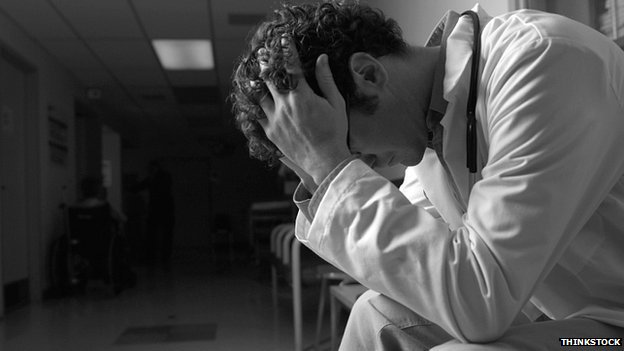
A large number of days have been lost to the emergency services due to stress
The number of days lost through stress-related sickness has risen by 70% among East of England public sector workers over five years, the BBC has found.
The days lost through sickness are costing public services millions of pounds a year.
Unions have said that public sector cuts, which have led to thousands of job losses, are part of the reason for the increase.
Public sector employers said they worked to relieve pressure on staff.
The BBC has analysed more than 100 Freedom of Information Act responses from police forces, councils, hospital trusts and fire and ambulance services in eight counties across the East of England.
The survey of police forces found increases in stress-related absences in 2013 compared to 2009 in Northamptonshire (143% up), Essex (128%), Bedfordshire (108%) and Thames Valley (17%).
Neil Goosey, branch secretary of Northamptonshire Police Federation, said cuts to the force and further planned cuts of£20m “cause so much anxiety and fear”, and were having a “huge impact on staff”.
A Northamptonshire Police spokesman said: “As a force, we deal with stress-related issues a lot more proactively than may have been the case in the past.
“For example, a year ago, we launched the Open Mind Network, an internal project designed to help people with stress problems.”
But police in Suffolk and Norfolk have seen a decline in days lost through stress.
Stress-related absence increased at the region’s three ambulance trusts
Suffolk Police lost 3,015 days in 2009, but this has dropped each year since, falling to 1,544 in 2013 (down 49% from 2009).
Norfolk Police saw a 60% drop over the five-year period.
Paul Marshall, Suffolk’s Deputy Chief Constable, said the force tried to visit staff at home during the early stages of their sickness and arranged a “return-to-work interview” when they came back.
“After a certain number of absences they will have an attendance support meeting, where a member of our human resource team together with the line manager sits down and talks through with that individual what’s causing the stress and how we might assist them,” he said.
The number of days lost by East of England Ambulance medical staff has risen from 1,948 in 2009 to 6,106 in 2013, a 213% increase.
East Midlands Ambulance Service saw a 257% rise from 2009 to 2013, while the rise for South Central Ambulance Service was 35%.
‘More pressure’
Suffolk Fire Service saw the number of days lost rise by 696% from 57 in 2009 to 454 in 2013.
Roy Humphreys, secretary of the Suffolk branch of the Fire Brigades Union, said the cuts have led to “more pressure on everybody”.
Mark Sanderson, Suffolk’s deputy chief fire officer, said: “We believe the rise in the number of days’ illness in this area relates to our improved monitoring arrangements and better reporting but we have also worked to try and reduce the perceived “stigma” associated with reporting stress, which can be related to a combination of work and home issues.”
Within Norfolk Fire Service, the figure rose from 95 in 2010 to 486 in 2013, up by 412%.
Suffolk County Council has seen a 48% drop in days lost due to stress between 2009 and 2013
In Cambridgeshire, 77 days were lost to sickness due to stress, anxiety or depression in 2009. For 2013 the figure was 340, a rise of 342%.
The survey found that last year more than 3,000 council staff across the East took time off for stress last year.
Mental health charity Mind in Suffolk said it was seeing a rise in the number of employers seeking support for workers.
Mind workplace specialist Ezra Hewing said the modern day workplace was becoming increasingly stressful.
Council worker Paul Charlton said his experience with mental health had given him a new view of the issues
“Some managers are lacking confidence or the know-how to address mental health specifically so they avoid having the discussions because they are perhaps concerned about triggering something off or making an existing situation worse,” he said.
The BBC found that the 68 district and county councils in the region which replied to our survey logged 123,082 days off due to stress in 2013, an increase of about 25% on the 2009 figure.
The rise in absence through stress comes at a time when councils are cutting staff to make savings.
Suffolk County Council worker Paul Charlton has suffered from low moods in the past and in the last four years has twice needed time off work.
Mr Charlton, an adult social care commissioner, said the experience had changed the way he approached colleagues now.
“I found myself having tantrums a few years ago in meetings and didn’t understand that my behaviour was changing because I was stressed – life was difficult,” he said.
“What I like to do now is simply be aware of other people.”
Extract from;
By Jon Wright
Reporter, BBC Radio Suffolk
